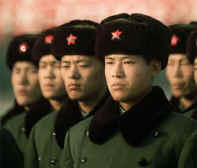The awakening of an economic giant and, perhaps, a nascent superpower.By John PomfretSunday, March 13, 2005; Page BW05 Writing about China is never easy. The country is so vast and full of contradictions that almost anything said about it at any given time is true. Writing about China is also increasingly fashionable. The country's emergence into a global economic and diplomatic player has made it an attractive topic for specialists and amateurs alike. With its ferocious sprint toward an uncertain future, modern China today makes for a compelling narrative. The trick is how to tell the story right.
Perhaps I am too close to my subject; I have lived in China for 10 of the past 24 years. But the longer I have stayed in China, the less patience I have for fresh-off-the-boat enthusiasts amazed at the spanking new skyline in Shanghai or Beijing. Too often, when these people write about China, they are actually using its successes as a way to mourn perceived problems back home. America is becoming complacent, uneducated, slow and bureaucratic, they say. Look at China; it's got all the answers. It's the future. But is it really?
 Skimming the Surface
Skimming the Surface Ted C. Fishman's
China, Inc.: How the Rise of the Next Superpower Challenges America and the World (Scribner, $26) is a breathless account of what he predicts will be the country's ascent to the ranks of the world's great economic powers. In his China, the graphs always go up, and the manifold problems with the economy -- its corruption, crumbling banks, feeble legal system, gap between rich and poor, real estate bubbles, and a political system that restricts the free flow of information and rewards connections rather than innovation -- are mere flotsam in the path of the whirlwind from Beijing.
Fishman has done exhaustive research, amassing enough information to have written an interesting and textured book. To illustrate the growth of the sex trade, for instance, he supplies data on the number of out-of-wedlock babies born in Shenzhen, the boomtown abutting Hong Kong. On every page, the reader is treated to lists of the biggest, tallest, longest, fastest whatevers that China is creating.
But secure in his belief that China is going to become a hyperpower in the very near future, Fishman (a former commodities trader and now a writer) often ignores his research or switches the subject. In one section, for example, he explores China's serious demographic problems. In some parts of the country, the population -- using ultrasound equipment and infanticide -- is now having 137 boy babies for every 100 girls. But
China, Inc. offers no discussion of the social effects this type of skewed demographics could have. Fishman comes to a dizzying stop, and we're off to a discussion of skyscrapers in Beijing.
He often just scratches the surface of fascinating topics. He writes interestingly about the "China price" -- the way that the prices of goods worldwide are being forced down by China's factories. He concludes that China will benefit greatly from this, but the reality is more complex. Chinese firms are also getting hammered by the very prices they are setting, and many can survive only because of unsustainable state subsidies. The more interesting point is that China, too, is getting crushed by its economic model, but Fishman does not explore this topic.
In a chapter entitled "Pirate Nation," Fishman again uses strong reporting to tell the story of how Chinese firms are ripping off the world, pilfering intellectual property rights and profiting mightily from it. The book's thesis is that "The counterfeiters give China's growing number of globally competitive companies the means to compete with powerful foreign rivals who are forced to pay full fare for proprietary technologies." Stealing may be a great business plan for several years, but it isn't viable over the long term, for one big reason: It means that Chinese firms won't invest in R&D because they know that whatever products they create will be ripped off as well. Without innovation, China's businesses won't achieve anything close to their potential.
Fishman generally avoids the tricky subject of politics. But when he does stray into political reporting, he is often tone-deaf or naive. "China could emerge overnight as the world's largest maker and consumer of movies, computer games, television programming and music," he writes. "All it would take are improvements in the enforcement of laws governing entertainment products and a dash of expressive freedom." A dash of expressive freedom? Obviously, the Chinese people have won substantial personal freedom since Deng Xiaoping instituted economic reforms in 1978. But Fishman seems to be implying that granting "expressive freedom" would be an easy thing for a Communist Party committed to a monopoly on power. Such lines, which pop up often in the book, underscore a lack of understanding of how China's political system works.
The Owlish Engineer On the other hand, Robert Lawrence Kuhn has no qualms about writing about Chinese politics. He has devoted 579 pages to it in
The Man Who Changed China: The Life and Legacy of Jiang Zemin (Crown, $35), his massive biography of the man who was at the helm of the Communist Party for 14 years, until stepping down in 2003. Kuhn, a managing director at Smith Barney/Citigroup and host of the PBS series "Closer to Truth," argues that Jiang was "habitually underestimated" by Chinese and foreigners alike. He credits Jiang with laying the foundations for China's record-beating growth in the 1990s, its political stability and the unprecedented expansion in personal freedom for many urban Chinese.
Kuhn's book reads like an official biography; indeed, he must have received official sanction to write it. In the course of his research, he interviewed Jiang's family members, Jiang's mentor in Shanghai and other high-ranking government and party officials. Such access is not granted easily in the People's Republic of China.
Kuhn has painted a detailed portrait of Jiang and provides interesting particulars about a man who was first noticed by Communist Party members as an engineer in an ice-cream factory. Kuhn has obvious affection for Jiang and obvious sympathy for the Communist Party's belief that it knows best what is good for China.
But his portrait of the owlish engineer who steered China into the 21st century has several problems. First, his main argument is that Jiang deserves credit for China's boom decade. That's debatable. Jiang was appointed head of the party after the 1989 Tiananmen Square crackdown on reformist demonstrators. Deng Xiaoping, the country's supreme leader, chose him because Jiang was not associated with the killings; Jiang had been party chief in Shanghai at the time and had moved swiftly to quell demonstrations there with a minimum of bloodshed.
But Jiang did not secure control over the party apparatus until 1995; for much of the 1990s, he was associated more with the hard-line wing of the party than with the economic reformers. The person who deserves credit for the '90s boom is the same one who started China's economic reforms (and ordered the Tiananmen Square crackdown): Deng Xiaoping. In 1992, fed up with three years of stalled economic growth and the increasingly shrill tone of party apparatchiks (which Jiang did not oppose), Deng took his famous "Southern Tour," during which he traveled to the boomtown of Shenzhen and coined the term "socialist market economy." Deng's trip, and his vocal support of private enterprise and privatization, sparked China's major changes -- not anything Jiang did.
Worse, a good deal of Kuhn's book reads as if it were written by a Chinese propaganda team. Kuhn argues that Jiang's political theory, called the "Three Represents," constitutes a brilliant revision of Marxist theory. But another view, held by Jiang's critics and not mentioned in the book, is that the "Three Represents" is actually a veiled justification for the creation of the elitist alliance of party officials, bureaucrats, intellectuals and businessmen that runs China today.
Similarly, Kuhn takes at face value Jiang's claims that he wants to fight corruption. He barely deals with allegations that some of Jiang's closest political allies (such as Jia Qinglin, the former party chief in Beijing and Fujian, whom Jiang placed on the Politburo's all-powerful Standing Committee) were elbow-deep in sleaze. Indeed, at the end of one chapter, Kuhn writes about a poem by Jiang called "Random Thoughts on Climbing Mount Huang." Kuhn waxes lyrical about Jiang's ruminations -- seemingly because he wants us to see Jiang not just as a practical politician but as a sensitive soul, out there on Huang Mountain contemplating the mist.
What Kuhn does not tell the reader is that the poem was published on the front page of the People's Daily in late May 2001, when Jiang was locked in a power struggle with party elders and trying, in his own way, to create a mini-cult of personality around himself. Kuhn also does not note that Jiang's minions in Shanghai immediately included the poem in a textbook for students there, marking the first time since the days of Chairman Mao that students would study the poetry of a living Chinese leader.
The Downside of the Boom Mount Huang is located in Anhui province, which plays heavily in Elizabeth C. Economy's
The River Runs Black: The Environmental Challenge to China's Future (Cornell Univ., $29.95). Of all these books, Economy's rings the truest. A fellow at the Council on Foreign Relations, she has written a book that, while academic in style, constitutes a fascinating and often depressing investigation into one of the major downsides of China's boom -- its degraded environment. Economy starts her work with a chapter on the nexus of corruption, bureaucratic breakdown and official incompetence that has combined to stymie efforts to clean up the Huai River -- arguably China's most polluted waterway. It is perhaps for this legacy -- of massive environmental degradation, putrid rivers and smoke-filled skies -- that China and Jiang Zemin will be best remembered.
China's emergence as a global economic and diplomatic player is a compelling story -- one about both a nation ferociously pursuing modernization and a nation that has lost its way. This combination makes for a complex tale -- one that is touched on in Economy's rich book but given short shrift in the works by Fishman and Kuhn. •
John Pomfret was The Washington Post's Beijing bureau chief from 1998 to 2003.








